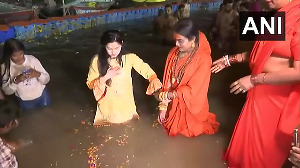True misogyny is when you stop being curious about women, and Milind Dhaimade directs his actresses with a sense of wonder.
Tu Hai Mera Sunday has delightful women characters, sketchy men, and individual threads that work better than the whole package, feels Sreehari Nair.

The characters in Tu Hai Mera Sunday wish to breathe more freely. And while the movie wants you to believe that this is a straight reaction to Mumbai’s talent for choking its residents, these characters are wheezing because their real home is a television series which has been remodelled into a two-hour motion picture.
The best stretches of Tu Hai Mera Sunday will remind you of the best era of Indian Television -- by which I mean the late 1990s and the 'very early' 2000s.
In fact, you would be wasted before you discover writer-director Milind Dhaimade's cinematic influences; for this a movie that suggests where Indian Television may have progressed to had it snorkeled off Hip Hip Hurray or built on Star Bestsellers.
Dhaimade seems to be making cinema here out of his memories of good Indian Television. And like a man trying for Pop in the Victorian age, he introduces a plot that’s too consciously-cinematic -- about a set of five friends and their endless search for a space where they can enjoy their game of Sunday football.
It’s this centerpiece of Tu Hai Mera Sunday that comes off as most unfelt -- it is the force-fit that doesn’t allow the movie’s interesting characters to develop, or its dramatic structure to find a natural course.
With its spirits all crossed, Dhaimade attempts a cover-up by giving Tu Hai Mera Sunday a heavy heart: but that heart isn’t heavy as much as it is sodden. And this soddenness eats into most of the movie’s achievements, primary among which are some carefully observed domestic scenes of behaviour and manner.
The film appears to be in search of lost time. It's not just 1990s television that Dhaimade finds comfort in, he clearly has a certain affinity for that age in toto.
THMS has the slightly-funky-slightly-pasty look of the pre-millennium Indian billboards. There are constant throwbacks to faded photographs and paraphernalia. There are Vintage MTV India-shots of painted faces on walls and real faces in the streets competing for attention. There are also the characters’ awkwardness and their issues that seem more worthy of a tastefully done TV commercial of that period.
And if these weren’t markers enough, there’s the laureate of 90s' staples, Vishal Malhotra, playing Dominic, his story the most entertaining of the lot.
Dominic has an elder brother (a terrific Suhaas Ahuja), Cain to Dominic’s Abel, who just has to look at Dominic with a smile to broadcast his petty victories. Usually, Dominic returns the look, but when Cain brings home a stunner (Maanvi Gagroo as Vinita) it feels like more than just a petty loss to swallow.
One sight of Vinita is enough for Dominic to dunk his head in the refrigerator, even as his mother (Rama Joshi) breaks off into a diatribe about Vinita being a Hindu.
It’s a hilarious scene of interlocking desperations and Malhotra hits it home. He's equally brilliant in a scene later when Vinita cozies up to him on the sofa at night. The tension gets to Dominic and he almost loses his neck, dipping more and more into his T-shirt as she keeps sliding closer.
It’s in such scenes of the mundane raised to charming that Tu Hai Mera Sunday scores.
There’s another beautifully written scene, in a restaurant, between Barun Sobti (Arjun) and Shahana Goswami (Kavya), set entirely to the wince-and-pause rhythm of talking. Both Goswami and Sobti light up that scene, their dry inner lips sticking to their gums so that every utterance comes out a little crafted, a little strained -- the scene has true pulling power!
Shahana Goswami’s Kavya, who lives in a home that has on its name-board the word Ranganathans, first appears storming out of her room with her teeth clenched. She does a little something in every sequence she appears thereon, and the screen comes alive in her silent deliberations and in the way her lower jaw stretches out her ending syllables.
Like Mrinmayee Godbole, who in Kranti Kanade’s CRD gave a performance capable of activating each sense, and Shweta Tripathi who is so generous she makes you aware of her process as she works it out, Shahana Goswami is an actress who prides herself in turning her scenes into glorious examples of give-and-take (very often, she improves the performances of her co-actors).
The female characters in this film are a lot more fully-formed than the male characters -- fighting through their dreary states, not accepting their conditions as eternal, and raising themselves to higher levels of consciousness.
True misogyny is when you stop being curious about women, and Milind Dhaimade directs his actresses with a sense of wonder and the actresses respond with lifelike performances.
Rasika Duggal, who plays a neighbour to one of the five guys, smiles through her tears. She has a terrific moment when she memorises a telephone number, her eyeballs almost reaching the back of her head.
Rama Joshi, who plays Dominic’s mother, fumes over pursed lips, and she shoots out expository dialogues in Konkani while managing to make them sound like high theatre.
Manvi Gagroo has an innate ability to take in her whole environment when she acts. As Vinita here, you never know if she's being contained perfectly within the movie or if she's exploding its borders.
The men are far less interesting; even their improvisations look planned and their spontaneity seem worked out in advance.
To go with Barun Sobti’s Arjun (who plays a monk in a world of machine men) and Vishal Malhotra’s Dominic, there’s Rashid (Avinash Tiwary), with a flophouse for a home, and whose adventures with a mouse helps him foster connections with humans.
The thin as a wire Mehernosh (Nakul Bhalla) -- with the face of someone who has been gulping down his sorrows for far too long -- displays psychopathic tendencies, but the film wants to celebrate the power of his spit. Neither Mehernosh's inner wirings nor his dramatic arc is believable.
Jay Upadhyay’s Jayesh is a man who has surrendered to his surrounding -- it’s always the voices around him that's changing his schedule or a force beyond him that's hoisting him over the shoulder.
At the dead centre of this group of five is Shivkumar Subramaniam -- Hindi cinema's preferred choice to essay plot devices -- as a senile old man who wanders into the quintet out of his love for football. He remembers nothing, but at one point you can overhear him saying Quantum Ball -- implying maybe that Physics and Football are the only constants in his fast-emptying life.
Individually, especially when they are with the women, the men have some vitality, but when they get together they just don’t convey any sense of history; you never get the feeling that they may have drank from each other’s mugs, or that each may have slipped a little bit of themselves into the others.
It’s united that they fall.
Tu Hai Mera Sunday is a movie that grows thinner as its scenes become denser. It has the length of a breezy movie but not the texture of a breezy movie.
The initial episodic narrative structure, with few shifts in dramatic tension are filled with light, original touches, but Milind Dhaimade under pressure to give the television material a movie-feel, piles on the familiar tropes, all leading up to the customary dénouements.
There’s the Cry for Space, the Competitive Mother trope, Cool Brother-in-Law trope, the mandatory shot of men being captured on camera while peeing in the open, the mandatory Goa Trip -- which like the Mumbai bits don’t really amount to anything except that it tires you out -- and the mandatory beach-and-shack shots.
Hell, in the end, they even bring out the supremely over-familiar Dead Mother’s Ring!
At a certain point, Dhaimade seems to have forgotten that the aphorisms of the 1990s are the clichés of 2017. In the process, he has here crafted something that never becomes the movie it could have been, or even the movie it wants to be.
From the beginning, and as the title implies, Tu Hai Mera Sunday is pitched as a story about ‘coming together.’ But Milind Dhaimade’s true strength, perhaps, is in taking a microcosm, splitting it, and analysing its small segments. It’s when he tries to bring everything together, that his energies get dispersed.
This is a film in which the snapshots work, but the collective voice simply fades out.












 © 2025
© 2025